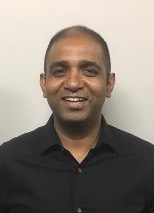 Santosh Mathan is an Engineering Fellow at Honeywell Aerospace. His research lies at the intersection of human-computer interaction, machine
Santosh Mathan is an Engineering Fellow at Honeywell Aerospace. His research lies at the intersection of human-computer interaction, machine
learning, and neurophysiological sensing. Santosh is principal investigator and program manager on several efforts to use neurotechnology in practical settings. These efforts, carried out in collaboration with academic and industry researchers around the world, have led to the development of systems that can estimate changes in cognitive function following brain trauma, identify fluctuations in attention, boost the activity of cortical networks underlying fluid intelligence, and serve as the basis for hands-free robotic control. Papers describing these projects have won multiple best paper awards at research conferences, and have been covered by the press in publications including the Wall Street Journal and Wired. He has been awarded over 19 US patents. Santosh has a doctoral degree in Human-Computer Interaction from the School of Computer Science at Carnegie Mellon University, where his research explored the use of computational cognitive models for diagnosing and remedying student difficulties during skill acquisition.
Scaling up Cognitive Efficacy with Neurotechnology
Cognition and behavior arise from the activity of billions of neurons. Ongoing research indicates that non-invasive neural sensing techniques can provide a window into this never ending storm of electrical activity in our brains, and yield rich information of interest to system designers and trainers. Direct measurement of brain activity has the potential to provide objective measures that can help estimate the impact of a system on users during the design process, estimating cognitive proficiency during training, and providing new modalities for humans to interact with computer systems. In this presentation, Santosh Mathan will review research in the Honeywell Advanced Technology organization that offer novel tools and techniques to advance Human Computer Interaction. While many of these research explorations are at an early stage, they offer the preview of practical tools that lie around the corner for researchers and practitioners with an interest in boosting human performance in challenging task environments.
His talk takes place on Friday, August 24, 2018 at 13:00 in room A112.